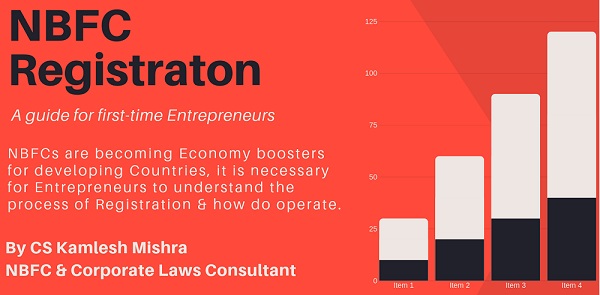NBFC stands for Non-Banking Financial Company and is registered under the Companies Act, 2013 and managed by RBI with activities very similar to the bank except for some major differences. NBFC is known to provide financial support and services to businesses and individuals. One of the principal objectives of a Non-Banking Financial Company is to provide loans, personal loans, working capital loans, shared investments, other stocks and debenture issued by the Government or the other local authorities, leasing, insurance business as well as offers Market Place Lending Platform (P2P) for businesses.
So predominantly, NBFC is trying to fix the financial gap which is often untouched when it comes to any organized or unorganized business and individuals. Banks in the recent times are more focused toward the Mid-Size loan to the Large Companies as well as SME/MSME based on their credit card score which has created a bigger loop for the NBFC to enlarge its presence in the financial market.

NBFCs are known to provide quick loans to the individuals as well as the corporates in contrast to the other banks which is the major reason for their popularity over the Traditional Banks. In India, less than 1 in 10 people have the credit history which makes them eligible for taking loans. Many Indian Fine Tech Startups are using the alternate credit scoring models in order to reject or approve the application of the loan. The NBFC Registration comes under the Companies Act 2013 and the RBI Act 1934. In India, The Reserve Bank of India is the supreme regulator of the NBFC, the growth of which is recorded to be 24.3% per year which is more than the Traditional Banks in India with the growth of around 21.4%.

Some of the engagements of a Non-Banking Financial Company are mentioned below:
- Advances and Loans
- Hire Purchase
- Leasing
- Insurance Business
- Chit Business
- Acquisition of the shares/ debentures/ bonds and securities of any nature.
An NBFC is different from the Traditional Banks in the following ways:
- NBFC can only accept the Public deposit and not the demand deposit.
- An NBFC cannot issue cheque drawn on itself as they are not the part of the settlement system or the part of the payment system.
- An NBFC does not guarantee insurance or the credit facility.
Some of the things that are not included under the ambit of NBFC are as under:
An NBFC does not necessarily include an institution with the following principal business. Such as:
1. Agriculture Activity
2. Industrial Activity
3. Sales or Purchase of any goods
4. Providing services such as purchase/construction/sales of an immovable property
How is NBFC as a Good Choice for Fintech Startups?
The traditional banks for the most part operates on a classic business model which costs a lot. On the other hand, NBFC with the FinTech Business Model focuses on operating from one single office and focuses mostly on the digital presence which reduces the operational cost to a great extent.
NBFC are meant to meet the financial needs of the majority of the underserved section of the business which is not accepted by the Traditional Banks of India. Also, the entire process of loaning money from the Traditional Bank is much slower in comparison to the NBFC and involves a lot of paper work which is not a case in NBFC. Credit Decision in NBFC takes lesser time which is a pro when it comes to loaning money from the banks.
Core functionalities of the Fintech Based Business Model
- It helps in addressing mass problems and customer acquisition process.
- It helps in shaping the customer behavior which then attracts online loan system.
- It helps in creating an app based loan system in 30 minutes.
- It creates an alternate digital banking system which more and more organizations can opt for.
- It uses the big data, Machine Learning tools and AI to minimize fraud to a great extent.
Classification of Non-Banking Financial Company
Normally, A NBFC can be deposit taking or non-deposit taking NBFC. However, there are various categories in which an NBFC License is categorized into based on the nature of the activity untaken by the organization. They are as under:
- Investment Company
- Core Investment Company
- Core Investment Company
- Asset Finance Company
- Loan Company
- Infrastructure Finance Company
Regulations of a Non-Banking Finance Companies
Depending on the type of NBFC’s registered under the Companies Act 2013, following regulators are followed, they are as under:
1. National Housing Bank – Housing Finance Institutions
2. NBFC registered with RBI where supervision, regulation, surveillance and enforcement is carried out under the Reserve Bank of India.
3. NBFCs regulated by other regulators with the authority of Regulation, surveillance, supervision and enforcement which depends on the type of Financial Institution which are as under:
1. Venture Capital Fund Company / Merchant Banking Company / Stock Broking / Collective Investment Schemes – Exchange and Security Board of India.
2. Chit Fund Companies that comes under the State Government
3. Mutual Benefit Companies and Nidhi Companies which comes under the Ministry of Corporate Affairs.
4. The Insurance Development and Regulatory Authority.
- Non- Financial and Non-Banking Companies with the supervision, regulation and surveillance under the Companies Act of 2013
Some of the advantages of a Non- Banking Finance Company are as under:
1. Low cost & Time: Registering a NBFC is considerably easy task as compared to register a small Bank. The cost & time both are excessive in terms of opening a Bank.
2. Easy Registration: NBFC Registration process is very easy if the consutant you have is experienced and having NBFC Registration experience.
3. Industry Growth Ratio: At present, the fintech industry is at boom as everyone needs an easy source of funding, it can be an advantage for aspiring Entrepreneurs to register a NBFC and earn good return in Fintech Industry
4. Easy Recovery of Loans: Since NBFCs are very systematic and they offer considerably less loan amount, therefore, borrowers return the amount easy which makes it convenient for lenders.
Pre-Requirement for a Non-Banking Finance Company Registration:
In order to obtain a secure and proper registration, some of the mandatory requirements are given as under:
- A company involved with a business mentioned in the above fields with procedure finance flow of a particular business with the capital asset of more than 50% for any year is mandated to register as a Non-Banking Finance Company.
- The company needs to be registered as per the provision, rules and regulation as per the Companies Act, 2013 or Companies Act 1956.
- The company needs to have a Net-Owned Capital Fund of INR- 2 Cr which includes Share Capital, Premium on Shares, and Reserves if any.
Requirements of Non-Banking Finance License for Finance Companies
There are various documents that are required before filing the application for COR with RBI for the NBFC License. The requirements are mentioned below:
- It is mandatory for the middle name of the company to be keywords such as Finance, Investment, Leasing, Capital Fintech, etc.
- Documents showing the highest qualification of the directors associated with the company.
- Net worth certificate of the shareholders, company, and directors which needs to be CA Certified.
- Registration of the company as a Public Limited or a Private Limited Company.
- There should be an explicit clause in the MOA explaining the financial or Investment of the company.
- It is important to have certified documents for the certification of Incorporation, MOA, as well as AOA, verified from the respective regional registrar of the companies.
- Document supporting the income proof of the shareholders, founders and directors of the company along with their KYC.
- Having a Banker Report regarding No Lien remark on the Initial Final deposit of Rs 2 Cr.
- A company must have an experienced NBFC Consultant.
- Report analysis of the credit card owned by the shareholders and the directors of the company.
- Submitting one of the directors’ profile who has a financial experience of 10+ years as a Senior Management in Bank or NBFC.
- It is important to have the credit report of the directors and the shareholders verified which keeps them from repaying the loan or financial facilities over life. In case there is a proper clarification of the delay, the RBI may accept the application for the same.
- The Initial capital of Rs. 2 Cr cannot be a borrowed capital.
- There needs to be a high-level business plan in order to get through the process of an NBFC License.
- A detailed action plan should be in place regarding the loan products and Credit & Risk Assessment Policy.
- An elaborate decision making as well as the organizational structure for the approval or the rejection of the application of a loan.
- Having a true copy of the Audited Balance Sheet with Profit & Loss account along with the auditor’s report of three years holding the company. This is mandatory if the applicant is a subsidiary of the Public Limited or Private Limited or Foreign Company.
- In case of an FDI, all the necessary FDI Compliance as per the FEMA Act must be compiled.
Financial Companies which are not regulated by the Reserve Bank of India:
The Reserve Bank of India supervises and regulates the companies that are engaged in the financial activities as their principal business. Any Company with the financial asset of more than 50% of its total asset is termed as an NBFC and is regulated by the Reserve Bank of India.
Documents Required for a Non-Banking Finance Company Registration
1. Incorporation Certificate of the Company
2. Documents related to the Management and administration of the Company.
3. The documents stating the Article of Association and Memorandum of Association of the form or company.
4. Documents verifying the location of the company.
5. Company Account which has been well audited for last three years.
6. Elaborate Information regarding the Director and the Partners associated with the Company.
7. Resolution from the board favoring the formation of NBFC.
8. A bank account with a minimum equity share of INR 2Cr.
9. PAN Card of the Company
10. Additional documents which can be asked at the time of verification.
Registration Process for a Non-Banking Financial Company
1. An online application needs to be submitted along with the required documents which generate a Company Application Reference Number
2. The hard copy of the documents as mentioned in the website during the filling of the form needs to be submitted in the Regional Office of the RBI.
3. After the submitted documents are approved, the regional office sends an application to the central office of the Reserve Bank of India which then goes through the intricate examination and background checking of the documents which then grants a certificate to the applicants’ company.
4. If all the terms and conditions as mentioned in the section 45-I A of the Reserve Bank of India Act are satisfied, the certificate is granted to the applicant for the Non-Banking Financial Company.
CS Kamlesh Mishra is a Member of ICSI and a Commerce Graduate from University of Delhi. He is a young and expert professional who is always keen to work on complex and critical issues on Corporate Laws, Business strategies and NBFCs. His in-depth knowledge of laws and research skills make him able to opine on even the most complex challenges. He has an exposure of giving consultancy to few of the big Indian and Foreign collaborations in order to assist them with their compliance. His core area of expertise includes Company Laws, Intellectual Property Laws, Insolvency Laws, FEMA Laws and Security Laws. He has also given consultation papers on the various subjects related to Corporate Laws. CS Kamlesh Mishra can be connected through his mail id on cskmalegal@gmail.com or at 7982659624.




















Whether NBFC regulated by RBI can be regiatered under MSMED Act as MSME?
yesterday i was going to registration when form was completed they allow me rs 1850 amount has to paid I paid rs 1850/- through AMT AMOUNT deducted from my saving account but registration had not done still yet application no forwarded me it is ATR-8YGSMM what to do further to refund my amount
Nice Post Sir, Thanks for sharing this information about nbfc registration and i want to know-what is nbfc registration fees in India.
If any professional services can be available for formation of new nbfc or takeover of existing one with RBI registration.
Thanks
I want to form the fresh P2P NBFC.
Do I required to first obtain Incorporation certificate from ROC and then proceed to file an application for certificate for registration from RBI?? or should I required to take first approval from RBI before commencing ROC incorporation procedure??
You are requested to give guidelines on following points to avoid any ambiguity:
1. Will ‘loan from own shareholders taken by a private limited nbfc’ come under the definition of Public Fund as per RBI Circular dated 01.09.2016 vide chapter II point 3 (xxv), though deposit/loan from own shareholders is not regarded “Public Deposit” and there is no outside fund, loan belongs to shareholders of company themselves.
2. Will ‘Overdraft against own Bank FDR taken by a private limited nbfc’ come under the definition of Public Fund/Bank finance as per RBI Circular dated 01.09.2016, whereas Bank FDR is not considered even as Financial Assets as per Rbi circular RBI/2011-12/446 DNBS (PD)CC.No.259 /03.02.59/2011-12 dated March 15, 2012 , since this Overdraft is only against NBFC’s own fund deposit as FDR to save interest, and there is no real Bank Finance, means anybody can take Overdraft against FDR without going through any process as in other bank Finance, where one has to be understood of having character of three C’s i.e. Capability, Capacity and Character. In another words, If there is no FDR, there will be no overdraft, means no real Bank Finance.
In addition to this, even bond or debenture issued against any other asset is not regarded as Public Deposit, thus Overdraft against FDR should not be regarded as Bank Finance/Public Fund since there is no real Bank Finance or outside Public Fund. AS PER Master Direction – Non-Banking Financial Companies Acceptance of PublicDeposits (Reserve Bank) Directions, 2016. Dated August 25, 2016 under head of Definitions : 3. For the purpose of these Directions, unless the context otherwise requires:
….
(xv) “public deposit” means a deposit as defined under section 45-I(bb) of the Reserve Bank of India Act, 1934 (2 of 1934), excluding the following:
….
f) any amount raised by the issue of bonds or debentures secured by the mortgage of any immovable property of the company; or by any other asset or which would be compulsorily convertible into equity in the company provided that in the case of such bonds or debentures secured by the mortgage of any immovable property or secured by other assets, the amount of such bonds or debentures shall not exceed the market value of such immovable property/other assets;
3. Will loan from ‘Holding private limited NBFC’ to its ‘associate private limited NBFC’ and vice versa or ‘loan within group entities to one another’ come under ‘inter corporate deposit’ under Public Fund as per RBI Circular dated 01.09.2016, since in real sense there is no outside Public Fund is involved. Even as per RBI at following sighthttps://www.rbi.org.in/scripts/FS_FAQs.aspx?Id=92&fn=14 under the head of
All you wanted to know about NBFCs point 16. It is guided that
Further, indirect receipt of public funds means funds received not directly but through associates and group entities which have access to public funds.
From this it can be deduced that as far as Public funds is concerned, Holding, Associates and group entities are regarded one, thus loan within themselves can also not be regarded as inter corporate deposit as per RBI Circular dated 01.09.2016 under Public Fund as there is no outside sources/fund is involved.
Hoping early guidance/interpretation,
Thanks with Regards,